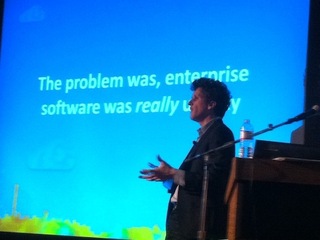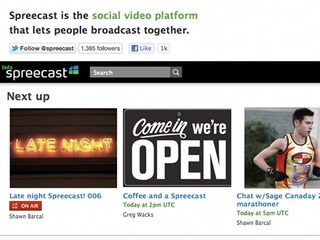
At this year’s Vator Splash in San Francisco, entrepreneurs and local companies got a chance to experience a different kind of keynote from CEO and founder of a social video broadcasting Spreecast, Jeff Fluhr.
After a brief introduction by Ellen Siminoff, President and CEO of the educational publishing company Shmoop University, Fluhr spoke to the crowd about how StubHub revolutionized the way tickets are sold and what elements of StubHub went into his new venture, Spreecast.
Fluhr was co-founder of StubHub, where he served as CEO from inception until its acquisition by eBay in 2007. Jeff sits on the board of or is an advisor to several consumer-oriented internet and mobile companies. He has been the recipient of several awards including the Joseph Wharton Award for Young Leadership, Sports Business Journal’s prestigious Forty Under 40 list and Entrepreneur Magazine’s 24 Best and Brightest young entrepreneurs in America. Earlier on in his career Fluhr worked at The Blackstone Group and Thomas Weisel Partners.
Spreecast recently launched its public beta and raised $4 million in seed funding from some notable media executives, including Frank Biondi, former CEO of Viacom, Gordon Crawford, media and tech investor at The Capital Research Group and Edward Scott, founder of BEA Systems.
Spreecast is in a similar space as Google+’s “Hangout” service, allowing people, such as public figures to conduct interviews or broadcast announcements to their fans or reporters, while allowing a certain group of them to be part of the video sharing platform.
Fluhr used the service that he founded, Spreecast, to show that his keynote was being broadcasted live on Spreecast and brought on some online participants to contribute to the Q&A at the end.
Here are some highlights from the keynote:
~ While in college, Fluhr wanted to attend the same game as several friends but he didn’t have a ticket. While getting a ticket at the event was not a big problem, the trick was getting anything close to the rest of the group. This became the catalyst where he knew that there had to be a better way to organize and get tickets for events.
~ With a lot of experience buying and selling tickets for sporting and other events the next trick was to translate that into a less fragmented and stigmatized process.
~ Fluhr and his co-founder wrote a business plan for Needaticket.com, which eventually became StubHub, and after speaking with investors and people in the media, they entered a post-bubble market that was finally leveling out a little in 2000.
~ What working on StubHub taught Fluhr was you have to have a stomach for a roller coaster ride since there are just so many companies that fail and, even successful companies experience wild swings.
~ In 2001, it was tough to raise capital and, when the company was two months away from running out of cash (and employees were deferring compensation), Fluhr finally snagged $1.5 million and nabbed an MLB deal. That was a steep change of pace, all in a matter of three months.
~ At StubHub, the founders had to deal with a lawsuit from the New England Patriots just as they were talks with eBay over an acquisition. That was one of those moments when they company could have really been shaken up, but when you have the stomach for the changes, it won’t throw you off too much.
~ Challenge the status quo. Just because it hasn’t been done, doesn’t mean that you can’t find a way. There were about 15 states that were restricting some aspect of the ticket resale market. The company spent a lot of time with state legislators talking about the free market and how to change the laws to help people unload their unused tickets without the stigma or legality hanging over them.
~ Trust your own instincts. For a while, people thought StubHub should buy up inventory and then re-sell it. Fluhr thought that was risky. If tickets didn’t sell then they woud be stuck with worthless merchandise and it seemed to go against the ethos of the company — they were a source for others to help in re-sale, not a warehouse that scoops up the tickets from people that want to go to an event.
~ It is all about the people. People are key to the execution of the idea and they are the moral support in those challenging dips. “When you are going with your own instincts . . . if you have people with a shared vision and beliefs then I think you can get through those times.”
~ Most of all, Fluhr is excited about his new project: Spreecast. There is an opportunity for people to come together face-to-face, but on the Internet. People are having conversations in passionate communities, but most of these conversations are text-based and the methods aren’t crossing over with the trend of using Skype or other video chats. With everyone carrying a video-taking device, the ability and desire to broadcast this content has really opened a door for Spreecast to allow people to have live broadcasting conversations with multiple parties.
~ Much like StubHub, Spreecast has been dealing with stigma because of the challenges and perception of previous companies like Chatroulette, but people are able to bring this into a professional or public persona exosphere so that they can engage with a specific audience. From disaster relief to politics or sporting conversations, Spreecast can help meld the world between Skype and chat forums.






















